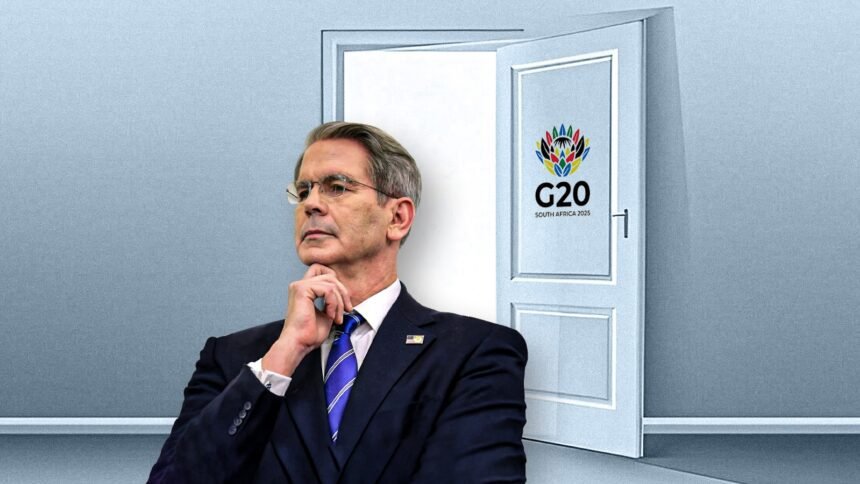Durban — The balmy July air in Durban didn’t just carry the scent of the Indian Ocean this week. It was thick with diplomatic caution, coded language, and a growing frustration that the adults in the global economy were being forced to move forward—without their traditionally loudest member. As G20 finance ministers gathered in South Africa for a summit themed “Solidarity, Equality, Sustainability,” the glaring absence of the United States Treasury Secretary was hard to ignore—and even harder to excuse.
This marks the second time this year the U.S. has skipped a major South African-hosted G20 economic meeting. For a nation that often insists on being at the centre of global economic affairs, its repeated no-shows speak volumes. And while American officials claimed “scheduling conflicts,” no one here was buying that excuse. The absence was interpreted by many as a diplomatic shrug—a clear signal that Washington is increasingly uninterested in playing the team sport of multilateral cooperation, especially in forums not led by its closest allies.
What makes this even more jarring is that the world’s economic outlook is anything but stable. Global debt levels are surging. Climate-related disasters are triggering humanitarian and economic crises at unprecedented rates. Digital economies, while booming, are leaving entire continents behind. The very themes South Africa chose—solidarity, equality, and sustainability—couldn’t have been more relevant or timely. But apparently, they weren’t tweet-worthy enough for Washington.
Finance ministers from across Africa and the Global South used the forum to press for reforms to international financial institutions, better debt restructuring frameworks, and climate financing that doesn’t come wrapped in red tape. But without the U.S. at the table, momentum was harder to generate. There was a sense of déjà vu: the world’s richest country asking others to trust the system it helped design, while refusing to show up when that very system needed recalibration.
South Africa, to its credit, handled the situation with the kind of diplomatic grace honed through years of navigating post-colonial tensions and modern geopolitical balancing acts. Finance Minister Enoch Godongwana reiterated the need for “inclusive multilateralism” and emphasized that African nations want to be contributors to global growth, not just recipients of aid or debt forgiveness.
Behind closed doors, however, the tone was sharper. Several G20 representatives privately expressed concern about the rising trend of protectionism among major economies—especially the United States. New tariffs proposed by Washington on imports from China, Mexico, and yes, even BRICS countries like South Africa and Brazil, hung like storm clouds over the Durban proceedings.
One delegate from Southeast Asia, speaking off the record, put it bluntly: “When the U.S. isn’t here, things still move. When the U.S. is here but won’t commit, it’s worse. It’s like being ghosted mid-negotiation.”
Another key discussion point in Durban was the restructuring of global debt frameworks. Countries like Zambia, Ghana, and Ethiopia have long called for fairer terms and more transparent lending mechanisms. The IMF’s traditional prescriptions—cut public spending, liberalize the economy, and pray for foreign investment—are losing their credibility in regions where they’ve produced more pain than progress.
South Africa and India jointly pushed for a new hybrid fund that could mobilize public and private finance for both debt relief and green infrastructure. While the proposal gained traction among emerging economies, it hit a wall with the G7 bloc—again, led by the ghostly silhouette of American absence.
And yet, the summit wasn’t without its wins. The African Union’s permanent inclusion in the G20, formalised just last year, gave the continent a stronger collective voice. Nigeria and Kenya both showcased national strategies for digital finance and climate resilience that could be models for other developing countries. Even Argentina, amid its own economic woes, presented a new mechanism for commodity-backed sovereign bonds aimed at reducing borrowing costs for resource-rich nations.
But even as the Durban meetings produced white papers, declarations, and mutual pledges, there was an unmistakable weariness in the air. How many more times, delegates asked, must developing countries prove their competence and commitment before they are treated as equals? And how much longer can global economic governance pretend to be “universal” when one of its most powerful players keeps ghosting the group chat?
Durban may not have delivered a new Bretton Woods, but it did offer something more realistic: a snapshot of a world learning, however uncomfortably, to move forward without always waiting for Uncle Sam’s blessing. And maybe that’s the real story.
In the end, South Africa hosted a summit that mattered—not because of who showed up, but because of who didn’t. The world’s grown-ups are trying to fix a broken economic system. Washington, it seems, is still hitting snooze.










